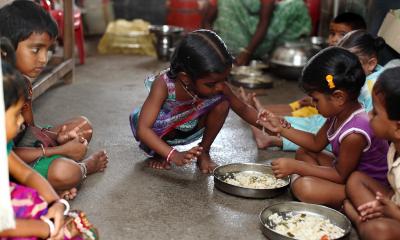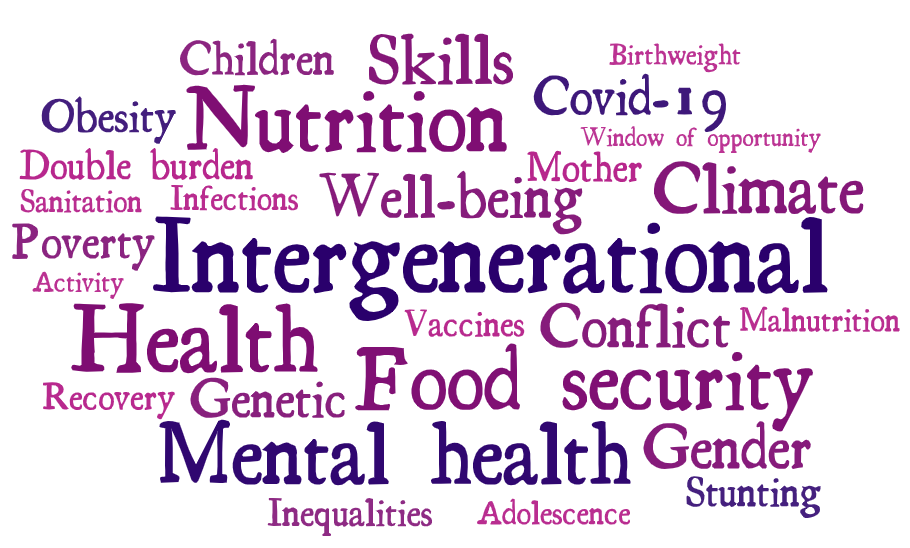
Health, well-being and good nutrition are fundamental to children and young people achieving their full potential in life, as set out in Sustainable Development Goals 2 & 3. Young Lives longitudinal data allows us to examine how exposure to poor health and nutrition in early childhood impacts later life outcomes, including learning and skills, and how widening inequalities reduce the resilience of vulnerable people to current crises, including the COVID-19 pandemic, conflict and climate change.
We have seen significant improvement in the health and well-being of the Young Lives children as they have grown into young adults over the last two decades. We can now start to monitor the health and well-being of the children of the children in our study. We see they are less likely than their parents to be physically stunted, and more likely to have access to antenatal care, clean water and sanitation than when the Young Lives study began, back in 2002.
Rates of teenage pregnancy have dropped substantially across all four countries, with public policies playing a key role in this development. Early maternal age is shown to have an overall detrimental effect on child's health and cognition, so consequently, this fall is likely to have positive inter-generational effects.
Despite this progress, widening inequalities expose disadvantaged children to shockingly high rates of undernutrition across all our study countries.
Malnutrition can have severe long-term consequences, affecting physical growth, cognitive skills, and learning in school. Importantly, our evidence shows that early growth stunting can be reversed over a much longer period than previously thought – well beyond the first 1,000 days, even up to the age of 15 years - and that physical recovery is associated with better performance in cognitive tests and progression through school. Sustained investment in children’s development throughout the first two decades of life is therefore crucial. Social protection programmes, including the Juntos cash transfer programme in Peru and the Productive Safety Net Programme in Ethiopia, can also play an important role in mitigating the impact of health shocks experienced early in life.
In recent years, we have also seen an increasing prevalence of over-nutrition and obesity, particularly in India, Peru and Vietnam, resulting in a growing health challenge of the double burden of malnutrition. This is being driven, at least in part, by changes in lifestyle and diet with sedentary behaviour increasing, alongside consumption of more highly processed food and sugary snacks. Rising levels of obesity put a generation at risk from an increasing prevalence of non-communicable diseases such as high blood pressure, diabetes, cardiovascular disease and some forms of cancer.

The young people in our study are navigating young adulthood amidst the economic and social impacts of an unprecedented series of global crises, the Covid-19 pandemic, escalating climate change and in Ethiopia, on-going conflict.
The COVID-19 pandemic led to widespread food insecurity around the world, with an increasing proportion of vulnerable Young Lives households running out of food, potentially reversing past progress in improving health and nutrition. Increased childhood exposure to climate shocks such as droughts and floods is also having an unequal impact on healthy diets and children’s development, with significant effects persisting across generations. Our evidence also shows that children from families displaced by conflict often experience lower cognitive development and physical stunting, compared to children whose parents migrated from non-conflict areas.
The pandemic also took its toll on mental health, with a striking fall in subjective well-being and increased levels of anxiety and depression among young people in our study. This occurred at a time of transition into new work and family lives, when they may be particularly vulnerable to developing long-term mental health conditions.
Our future research will seek to better understand how the COVID-19 pandemic and climate related shocks impact the health and well-being, and nutrition, of vulnerable communities, with an increasing focus on the intergenerational effect of intersecting inequalities on long term development outcomes. This will include further analysis on physical and mental health, including early-life determinants of mental health, and the complex interplay between mental health and employment.
Health, well-being and good nutrition are fundamental to children and young people achieving their full potential in life, as set out in Sustainable Development Goals 2 & 3. Young Lives longitudinal data allows us to examine how exposure to poor health and nutrition in early childhood impacts later life outcomes, including learning and skills, and how widening inequalities reduce the resilience of vulnerable people to current crises, including the COVID-19 pandemic, conflict and climate change.
We have seen significant improvement in the health and well-being of the Young Lives children as they have grown into young adults over the last two decades. We can now start to monitor the health and well-being of the children of the children in our study. We see they are less likely than their parents to be physically stunted, and more likely to have access to antenatal care, clean water and sanitation than when the Young Lives study began, back in 2002.
Rates of teenage pregnancy have dropped substantially across all four countries, with public policies playing a key role in this development. Early maternal age is shown to have an overall detrimental effect on child's health and cognition, so consequently, this fall is likely to have positive inter-generational effects.
Despite this progress, widening inequalities expose disadvantaged children to shockingly high rates of undernutrition across all our study countries.
Malnutrition can have severe long-term consequences, affecting physical growth, cognitive skills, and learning in school. Importantly, our evidence shows that early growth stunting can be reversed over a much longer period than previously thought – well beyond the first 1,000 days, even up to the age of 15 years - and that physical recovery is associated with better performance in cognitive tests and progression through school. Sustained investment in children’s development throughout the first two decades of life is therefore crucial. Social protection programmes, including the Juntos cash transfer programme in Peru and the Productive Safety Net Programme in Ethiopia, can also play an important role in mitigating the impact of health shocks experienced early in life.
In recent years, we have also seen an increasing prevalence of over-nutrition and obesity, particularly in India, Peru and Vietnam, resulting in a growing health challenge of the double burden of malnutrition. This is being driven, at least in part, by changes in lifestyle and diet with sedentary behaviour increasing, alongside consumption of more highly processed food and sugary snacks. Rising levels of obesity put a generation at risk from an increasing prevalence of non-communicable diseases such as high blood pressure, diabetes, cardiovascular disease and some forms of cancer.

The young people in our study are navigating young adulthood amidst the economic and social impacts of an unprecedented series of global crises, the Covid-19 pandemic, escalating climate change and in Ethiopia, on-going conflict.
The COVID-19 pandemic led to widespread food insecurity around the world, with an increasing proportion of vulnerable Young Lives households running out of food, potentially reversing past progress in improving health and nutrition. Increased childhood exposure to climate shocks such as droughts and floods is also having an unequal impact on healthy diets and children’s development, with significant effects persisting across generations. Our evidence also shows that children from families displaced by conflict often experience lower cognitive development and physical stunting, compared to children whose parents migrated from non-conflict areas.
The pandemic also took its toll on mental health, with a striking fall in subjective well-being and increased levels of anxiety and depression among young people in our study. This occurred at a time of transition into new work and family lives, when they may be particularly vulnerable to developing long-term mental health conditions.
Our future research will seek to better understand how the COVID-19 pandemic and climate related shocks impact the health and well-being, and nutrition, of vulnerable communities, with an increasing focus on the intergenerational effect of intersecting inequalities on long term development outcomes. This will include further analysis on physical and mental health, including early-life determinants of mental health, and the complex interplay between mental health and employment.



